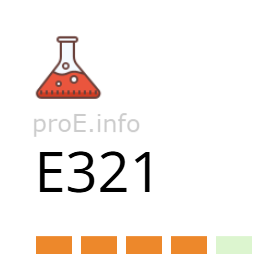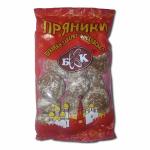
Other names for the additive (synonyms)
General information
Butylated hydroxytoluene (food additive E321) is a synthetic compound that is a derivative of toluene and phenol, used in the food industry as an antioxidant. Worldwide, butylated hydroxytoluene is better known as BHT.
Additive E321 has an exclusively synthetic origin and does not occur naturally. Butylated hydroxytoluene was first obtained in the mid-20th century as a substitute for natural antioxidants.
The chemical formula of the substance is C15H24O. In its physical properties, BHT is a white crystalline powder that is poorly soluble in water (about 1 mg/L), but readily soluble in fats, showing pronounced lipophilic properties.
Industrially, additive E321 is produced by the reaction of p-cresol with isobutylene, using sulfuric acid as a catalyst.
An alternative synthesis method is also known – from 2,6-di-tert-butylphenol via hydroxymethylation or aminomethylation followed by hydrolysis.
Effects on the Body
Benefits of Additive E321
Additive E321 is structurally similar to tocopherols (vitamin E), but unlike them, it is entirely artificial in origin. As a synthetic analogue of vitamin E, BHT is able to inhibit the self-oxidation of unsaturated organic compounds by atmospheric oxygen and other free radicals.
Some studies indicate that, in combination with L-lysine and vitamin C, BHT may exhibit antiviral effects, particularly against the herpes virus.
Risks of Additive E321
Despite its widespread use, the safety of BHT remains a matter of debate. A number of studies link high consumption of the additive to hyperactivity in children, as well as carcinogenic effects when acceptable doses are exceeded.
A study on zebrafish larvae showed that BHT induces hyperactivity and alters the expression of dopamine-related genes, which may point to similar behavioral risks during nervous system development.
In rats, prolonged oral administration of high doses of BHT (250–500 mg/kg/day) caused liver damage and enlargement, as well as alterations in enzymatic systems associated with increased risk of liver tumors. Another study on rat offspring showed a dose-dependent increase in hepatic adenomas and carcinomas at doses of 100–500 mg/kg/day.
Based on existing studies, the Joint FAO/WHO Expert Committee on Food Additives (JECFA) in 1996 established an ADI (acceptable daily intake) of 0–0.3 mg/kg body weight.
Earlier, in 1989, the European Scientific Committee on Food (SCF) defined a stricter limit – 0–0.05 mg/kg body weight.
In 2012, the EFSA Panel on Food Additives and Nutrient Sources added to Food (ANS) conducted a re-evaluation of additive E321 and confirmed that BHT does not pose a genotoxic hazard when ADI is respected. However, exceeding the limits may be unsafe. The Panel set an ADI for additive E321 at 0.25 mg/kg body weight per day.
Uses
In the food industry, additive E321 is used as an antioxidant to stabilize oils, fats, margarines, breakfast cereals, snack foods, as well as to prevent rancidity in nuts and seeds.
Additive E321 is often used in combination with other antioxidants (for example, with additive E320) to achieve synergistic effects and better thermal stability.
Beyond the food sector, BHT is used in cosmetics, pharmaceuticals, plastics, rubber products, jet fuel, and transformer oils as a stabilizer and antioxidant.
Legal status
In EU countries, butylated hydroxytoluene is permitted in food products under Regulation (EC) No 1333/2008, with an ADI set at 0.25 mg/kg body weight.
Ukraine, following European legislation, also allows the use of additive E321 in food products.
The FDA (USA) lists the additive among permitted antioxidants but emphasizes the need for strict dosage control.
Canada, Japan, Australia, and CIS countries also allow the use of additive E321, provided established limits are observed.
In some countries (e.g., the United Kingdom and Norway), the use of BHT is additionally restricted due to potential health risks.
